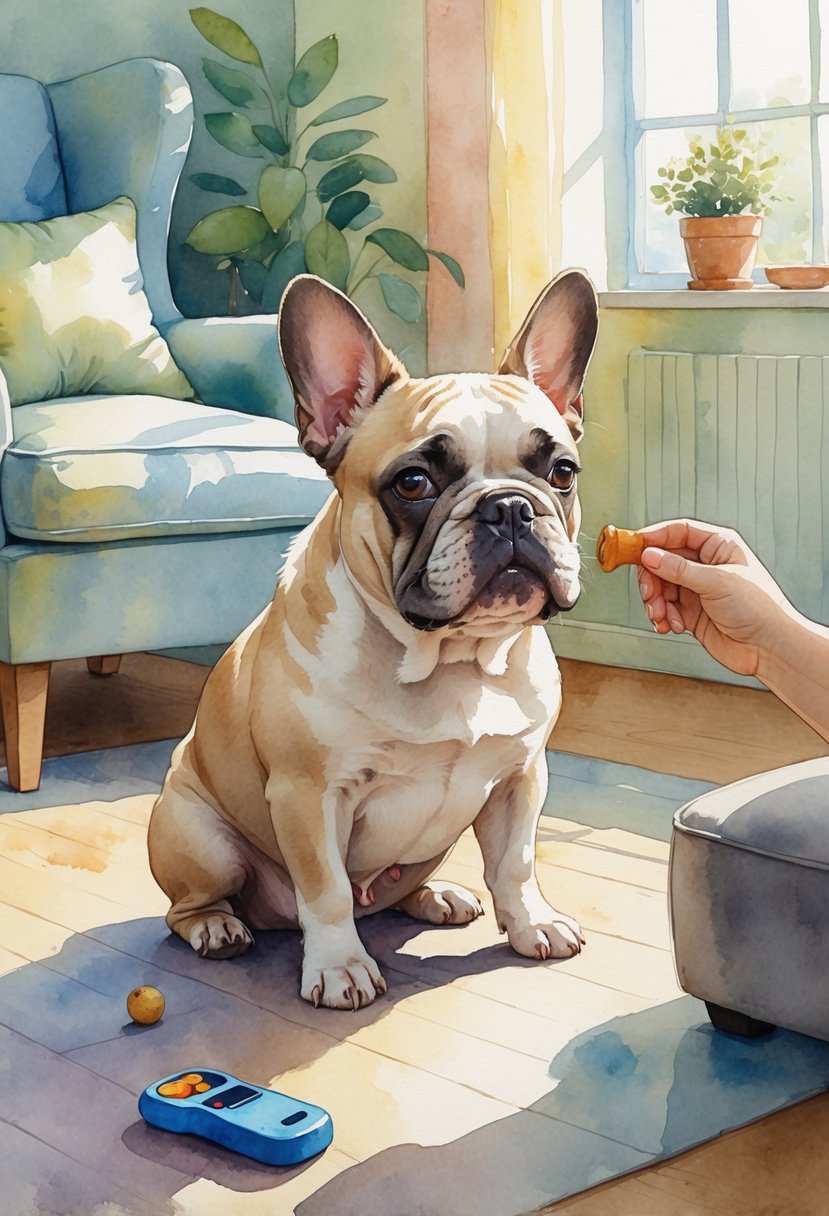Training a French Bulldog really takes patience. The real secret, though? It’s how steady you stay with your approach.
Frenchies are smart, playful, and a bit stubborn. If the rules keep changing, they get confused fast.
Consistency gives your French Bulldog clear signals. They’ll understand what you expect and training just gets smoother for both of you.

Using the same commands, tone, and rewards every time helps your Frenchie learn faster. They connect actions with outcomes—like sitting for a treat or walking calmly on a leash.
A steady approach prevents frustration and builds trust. That’s just as important as teaching commands.
Predictable routines make it easier to manage stubborn moments. Instead of testing limits, your dog knows what behavior earns praise.
That structure speeds up learning and creates a stronger bond between you and your pup.
Key Takeaways
- Steady training builds clear communication
- Predictable routines help manage stubborn behavior
- Consistency strengthens learning and trust
Why Consistency Matters in French Bulldog Training
When you train your French Bulldog, steady routines help them learn faster and trust you more. Clear rules and repeatable actions make it easier for your Frenchie to understand what you want.
Establishing Clear Expectations
Your Frenchie needs to know what you expect. If you sometimes let them jump on the couch and other times scold them, they won’t get the rule.
Keeping your responses the same every time sets a standard they can follow. Consistent commands help your dog connect words with actions.
Always using the same word for “sit” teaches them it has one meaning. Mixing up words or tones just slows progress.
A simple list of commands makes things easier. Share it with family members so everyone’s on the same page.
Quick tip: Write down your top 5 rules and make sure everyone enforces them the same way.
Building Trust With Your Frenchie
When you act the same way each time, your Frenchie learns to trust you. They know what will happen if they follow a command, and that predictability feels safe.
Trust grows when you reward good behavior every time. If you sometimes give treats and other times ignore their effort, your Frenchie might lose motivation.
Frenchies are sensitive. Sudden changes in rules or tone can make them nervous.
A stable routine makes training calm and positive. That’s what really strengthens your bond.
You’re showing your Frenchie you’re reliable, and that reliability builds respect.
Preventing Confusion and Mixed Signals
French Bulldogs can be stubborn, but a lot of that comes from not knowing what you want. Inconsistent training sends mixed signals and leaves your dog frustrated.
If you let your Frenchie pull on the leash one day but correct them the next, they’re left guessing. This back-and-forth creates habits that are tough to break.
Set a routine and stick to it. Use the same commands, tone, and rewards every time.
Here’s a simple table to show the difference:
| Inconsistent Training | Consistent Training |
|---|---|
| “Sit” sometimes means sit, other times ignored | “Sit” always means sit, always rewarded |
| Rules change based on mood | Rules stay the same every day |
| Dog feels uncertain | Dog feels confident |
Removing confusion makes learning smoother and less stressful for both of you.
Understanding French Bulldog Behavior
French Bulldogs are affectionate and playful, but they’ve got a stubborn streak. Their behavior mixes loyalty, sensitivity, and independence.
That’s why consistency in training matters so much. Clear expectations and steady routines help them feel secure and bring out their best.
Common Behavioral Traits of Frenchies
Frenchies are famous for being affectionate companions. They love staying close and will follow you around the house.
This strong attachment makes them great family dogs, but it can also lead to separation anxiety if left alone too long.
They’re playful and curious, but not super energetic. Most Frenchies prefer short bursts of activity and then a nice long nap.
Moderate exercise—short walks or indoor games—works best. You’ll also notice their stubborn side.
They’re smart, but if they sense inconsistency, they’ll test limits. Positive reinforcement with treats, praise, or play works way better than harsh discipline.
Frenchies don’t bark a lot, but they use body language and facial expressions to communicate. Learning to read their signals helps you respond to their needs and avoid frustration.
The Role of Routine in Shaping Behavior
A steady routine gives your Frenchie structure and confidence. When meals, walks, and potty breaks happen on schedule, your dog learns what to expect and feels more relaxed.
Consistency helps with house training. Taking your Frenchie outside at predictable times reduces accidents and speeds up learning.
Pairing this with immediate rewards builds strong habits. Daily routines also guide obedience.
Practicing commands like sit or stay at regular times reinforces good behavior. Short, scheduled sessions work better than long, random ones.
Even play and rest benefit from routine. When your Frenchie knows when it’s time to play and when it’s time to chill, they’re less likely to act out or demand attention at the wrong times.
Impact of Inconsistent Training on Behavior
Inconsistent training can really confuse your Frenchie. If you sometimes reward a behavior and other times ignore it, your dog won’t know what you expect.
This often leads to stubbornness or repeated mistakes. Mixed signals slow down obedience training.
Allowing jumping on guests one day but scolding it the next just muddles the rules. Inconsistency can also make unwanted habits worse, like barking for attention or ignoring commands.
Without clear boundaries, your dog may push limits more often. Over time, this can strain your bond.
Frenchies want to please you, but they need clear, steady guidance.
Consistency and Effective Communication
Your French Bulldog learns best when you use the same approach every time. Clear repetition helps them understand what you expect.
Steady cues prevent confusion and make training smoother.
Reinforcing Commands Through Repetition
When you repeat a command the same way each time, your Frenchie starts to recognize the pattern. This repetition builds a strong link between the word, the action, and the reward.
Without it, your dog might respond sometimes and ignore you other times. Keep training sessions short—about 5–10 minutes—and practice a few times a day.
If you’re teaching “sit,” always pair the word with the same hand motion and give a treat right after they follow through.
A table can help you track progress:
| Command | Sessions per Day | Reward Used | Progress Notes |
|---|---|---|---|
| Sit | 3 | Small treat | Responds quickly |
| Stay | 2 | Praise | Holds for 5 sec |
Repeating commands in a structured way gives your dog the chance to practice and succeed. Over time, their responses become more reliable.
Using Consistent Cues and Signals
Frenchies respond well when you use the same cues for each behavior. Switching between words or gestures just confuses them.
Pick one and stick with it. If you use “come,” don’t suddenly switch to “here.”
Tone matters, too. A calm, clear command works better than shouting or changing your pitch every time.
Dogs notice small differences, and mixed signals slow their progress. Make sure everyone in your household uses the same cues.
If you say “off” for jumping but someone else says “down,” your Frenchie won’t know which to follow. Writing a simple list of commands for the family helps keep training uniform.
Steady cues create a clear language between you and your dog. That makes communication easier and helps your Frenchie feel more secure.
French Bulldog training works best when you repeat lessons the same way each time. Regular practice helps your dog remember commands and reduces confusion.
Short Attention Spans and Repetition
Frenchies have short attention spans. They learn best in short, repeated sessions instead of long lessons.
A 5–10 minute session a few times a day beats a single long one. Repetition strengthens memory.
Using the same words, tone, and hand signals helps your dog connect the action with the command. Over time, this clear pattern helps your Frenchie respond faster.
Try not to mix too many commands in one session. Focus on one or two skills at a time.
This keeps your dog from getting overwhelmed and boosts their chance of success.
Training is like building blocks—each small, repeated step creates a stronger base for the next skill.
Tips for short sessions:
- Keep lessons under 10 minutes
- Use the same command words
- Repeat each skill several times
- End on a positive note with praise or a treat
Avoiding Regression in Training Progress
Without consistency, French Bulldog behavior can slip backward. If you skip sessions or change commands, your dog might forget what you taught or fall back into old habits.
Regression often happens when training is irregular. For example, if you allow your dog on the couch one day but scold them the next, the mixed signals confuse them.
They won’t know which behavior is correct. To prevent this, keep rules and commands steady.
Everyone in the household should use the same words and routines. This avoids setbacks and helps your dog feel secure.
Write down which commands your dog has mastered and which need more work. That helps you stay consistent and prevents gaps in training.
By being predictable and steady, you make it easier for your French Bulldog to remember what they’ve learned and keep moving forward.
Consistency in Addressing Stubbornness

French Bulldogs often show a mix of independence and stubborn behavior. Staying consistent helps you guide their choices, reduce confusion, and keep training progress moving forward.
Managing Independent Thinking
Frenchies have a real independent streak. They’ll test boundaries and sometimes ignore commands if they sense any inconsistency.
If you use the same words, tone, and timing every time, you make it way easier for your dog to connect the command with the action.
Set clear rules for daily routines like feeding, walking, and playtime. If you sometimes let them jump on the couch and other times scold them for it, your French Bulldog won’t know what you expect.
That confusion? It often just looks like stubbornness.
To keep things simple, try:
- Use one command word for each action.
- Reward the same behavior every time it happens.
- Have all family members follow the same rules.
Overcoming Training Plateaus
Even with steady practice, you might hit a point where your French Bulldog just stops improving. Honestly, it happens to almost everyone.
It usually means your dog needs more repetition, or maybe a slight change in how you present the task.
Keep sessions short—about 5 to 10 minutes—and repeat them daily. Frenchies seem to respond better when training feels like a routine, not a random lesson.
If progress stalls, stick to the same rules but mix up the reward. Try switching from treats to praise, or toss in a favorite toy to keep things interesting.
A simple table can help track progress:
| Command | Date Started | Current Response | Notes |
|---|---|---|---|
| Sit | Aug 1 | 80% success | Needs quicker response |
| Stay | Aug 5 | 60% success | Improve duration |
Creating a Consistent Training Routine

Your French Bulldog learns best when you stick to a clear pattern. Daily structure cuts down on confusion.
Shared rules across the household keep training steady and fair.
Setting a Daily Schedule
French Bulldogs do better when they know what to expect. Set regular times for meals, bathroom breaks, and short training sessions.
This helps your dog connect certain times of day with specific actions, like going outside after eating.
Keep training sessions short—about 5 to 10 minutes. That way, your Frenchie won’t get bored and will stay focused.
Use the same commands each time, and reward with small treats or praise. Consistency in both timing and language makes it so much easier for your dog to remember what you want.
A simple schedule might look like this:
| Time of Day | Activity |
|---|---|
| Morning | Potty break + 5 min training |
| Afternoon | Short walk + practice “sit” or “stay” |
| Evening | Potty break + 5 min training |
Repeating this structure each day builds habits your French Bulldog can follow without stress.
Involving the Whole Family
If more than one person cares for your French Bulldog, everyone needs to follow the same rules. Using different commands or reward styles just confuses your dog and slows progress.
For example, if you say “down” but someone else says “off”, your dog might not know which one to follow.
Agree on a list of commands and keep them consistent. You can even write them on a note and stick it somewhere everyone sees.
This way, your French Bulldog hears the same words and gets the same response from each person.
Consistency also means keeping routines the same. If one person lets the dog on the couch and another doesn’t, training gets a lot harder.
When the whole family works together, your French Bulldog learns faster and feels more secure.
Long-Term Benefits of Consistent Training

When you train your French Bulldog with steady routines, you shape their behavior in ways that can last for years.
This kind of consistency builds trust, encourages cooperation, and just makes everyday life smoother for both of you.
Strengthening the Human-Frenchie Bond
Consistent training gives your French Bulldog clear expectations. When you use the same commands and rewards, your dog learns to trust you and feels secure in your guidance.
This trust strengthens your bond and makes your Frenchie more eager to please.
Daily practice also creates shared routines. Whether it’s a short obedience session or reinforcing manners during walks, these moments become a form of quality time.
Your Frenchie starts to associate learning with positive attention, which makes them more affectionate and responsive.
A steady training approach also cuts down on frustration.
If you change rules often, your dog may feel confused or anxious. By staying consistent, you give stability, which helps your Frenchie relax and enjoy interactions with you.
Over time, this leads to a calmer, more connected relationship.
Encouraging Lifelong Good Habits
French Bulldogs are smart, but honestly, they can be pretty stubborn. If you stick with consistent training, you’ll stop unwanted behaviors—like jumping on guests or ignoring you when you call—before they turn into real problems.
Repetition really teaches them what’s okay and what’s not. Over time, good manners just become part of who they are.
You’ll probably notice that being consistent makes day-to-day routines less stressful. For example:
- House training: way fewer accidents inside
- Leash manners: walks feel calmer, less pulling
- Social behavior: greetings with people and pets stay polite
Start reinforcing these habits early and keep at it. That way, your Frenchie’s set up for a smoother life, even as they get older.



